When it comes to taking care of our finned friends, diet is one of the most crucial aspects. As a betta fish owner, you may have wondered at some point: “Can I feed my betta fish goldfish food?” While it might seem convenient to use the same food for different fish species, the reality is that not all fish foods are created equal.
In this article, we’ll dive deep into the dietary needs of betta fish, explore the differences between betta and goldfish food, and provide you with the information you need to keep your betta healthy and happy.
Betta Fish Dietary Needs
Betta fish, also known as Siamese fighting fish, originate from the shallow waters of Southeast Asia. In the wild, they primarily feed on insects and small crustaceans, making them carnivorous by nature. This means that their diet requires a high amount of protein to stay healthy. Unlike herbivorous fish that thrive on plant-based foods, bettas need a diet rich in animal proteins to maintain their vibrant colors and active behavior.
Nutritional Requirements of Betta Fish
Bettas require a diet that is about 30-50% protein. This is crucial for their muscle development and overall health. Additionally, they need some fats for energy and a minimal amount of carbohydrates. The best betta foods are specifically formulated to meet these needs, ensuring that they get all the essential nutrients.
Why Protein Is Essential for Bettas
Protein is the building block for the growth and repair of tissues in bettas. Without sufficient protein, bettas can become lethargic, lose their bright colors, and even become more susceptible to diseases. This is why it’s important to choose food that is specifically designed for betta fish, rather than generic fish food that may not meet their dietary needs.
Goldfish Dietary Needs
Goldfish, on the other hand, have very different dietary needs. While goldfish are omnivores, they can consume both plant and animal materials. In their natural habitat, they often feed on algae, plant matter, and small insects. Goldfish food typically contains a mix of proteins, carbohydrates, and plant matter to support their overall health.
Nutritional Profile of Goldfish Food
Goldfish food is generally lower in protein and higher in carbohydrates compared to betta food. This is because goldfish have a slower metabolism and do not require as much protein for energy. Instead, they benefit more from a balanced diet that includes a variety of nutrients.
How Goldfish Food Differs from Betta Food
The key difference between goldfish and betta food lies in their formulation. Goldfish food is designed to support a slower metabolism and longer digestive tract, while betta food is formulated to provide quick bursts of energy and support a more active lifestyle. Feeding bettas goldfish food on a regular basis can lead to malnutrition and health issues over time.
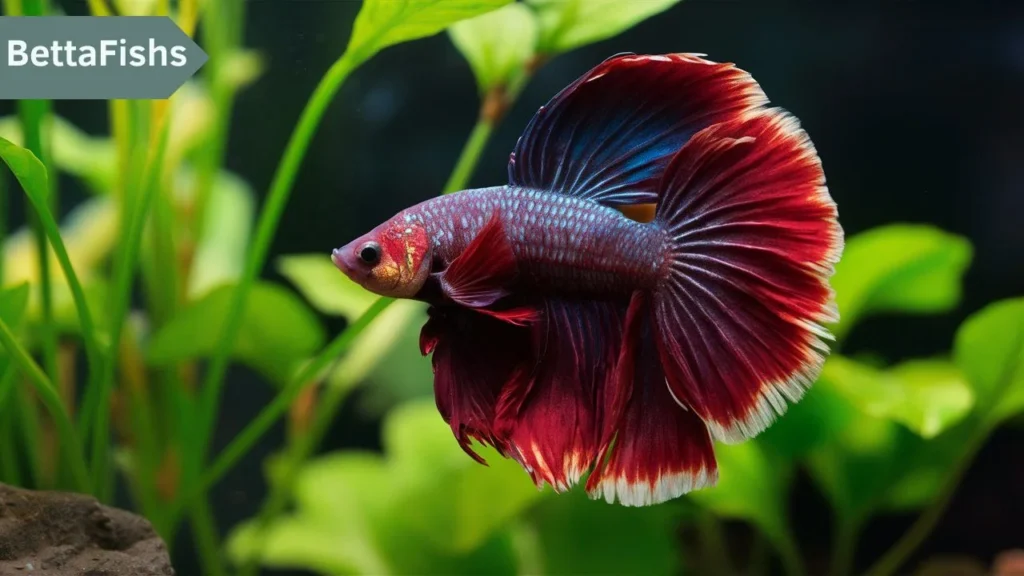
Can Betta Fish Eat Goldfish Food?
While betta fish can technically eat goldfish food, it’s not recommended as a long-term solution. The occasional feeding of goldfish food is unlikely to cause immediate harm, but it doesn’t provide the proper nutrients that bettas need to thrive.
What Happens If You Feed Bettas Goldfish Food
If you consistently feed your betta goldfish food, they may not receive enough protein, leading to sluggishness, dull coloration, and a weakened immune system. Over time, this can result in more serious health problems such as fin rot, bloating, and even death.
Potential Risks and Consequences
The most significant risk of feeding bettas goldfish food is malnutrition. Bettas require specific nutrients that are not adequately provided by goldfish food. Additionally, goldfish food may contain fillers that can lead to digestive issues in bettas, further compromising their health.
Occasional vs. Regular Feeding: What You Need to Know
If you’re in a pinch and have no other option, feeding your betta a small amount of goldfish food once or twice isn’t the end of the world. However, it should not become a habit. Always return to a betta-specific diet as soon as possible to ensure your fish remains healthy.
Why Betta-Specific Food Is Important
Betta-specific food is formulated with the exact nutritional needs of bettas in mind. It typically contains a higher percentage of protein, along with the right balance of fats and minimal carbohydrates.
Formulation Differences
Betta food is designed to be easily digestible for bettas, with ingredients that are closer to what they would naturally eat in the wild. This helps to maintain their energy levels, vibrant colors, and overall health.
Benefits of Feeding Bettas the Right Food
When you feed your betta the right food, you’re not just keeping them full—you’re ensuring they live a long, healthy life. Proper nutrition can lead to brighter colors, more active behavior, and a stronger immune system, which helps them fend off diseases.
Common Ingredients in Betta Food
High-quality betta foods often contain ingredients like fish meal, shrimp meal, and other sources of animal protein. They may also include vitamins and minerals to support overall health. It’s important to read labels and choose food that lists protein sources as the first ingredients.
Signs Your Betta Is Not Eating Properly
It’s important to monitor your betta’s eating habits to ensure they’re getting the nutrition they need.
Behavioral Signs of Malnutrition
If your betta is not eating properly, you may notice lethargy, reduced activity, and a lack of interest in food. They may also hide more frequently and become less responsive.
Physical Symptoms to Watch Out For
Physically, a malnourished betta may develop a sunken belly, lose their vibrant colors, or show signs of fin damage. Their scales may also appear dull or rough.
How to Address Dietary Issues
If you suspect your betta is not eating properly, try offering different types of betta food to see if they prefer one over the other. You may also need to adjust the temperature of their tank, as bettas are more likely to eat when the water is at the right temperature (around 78-80°F).
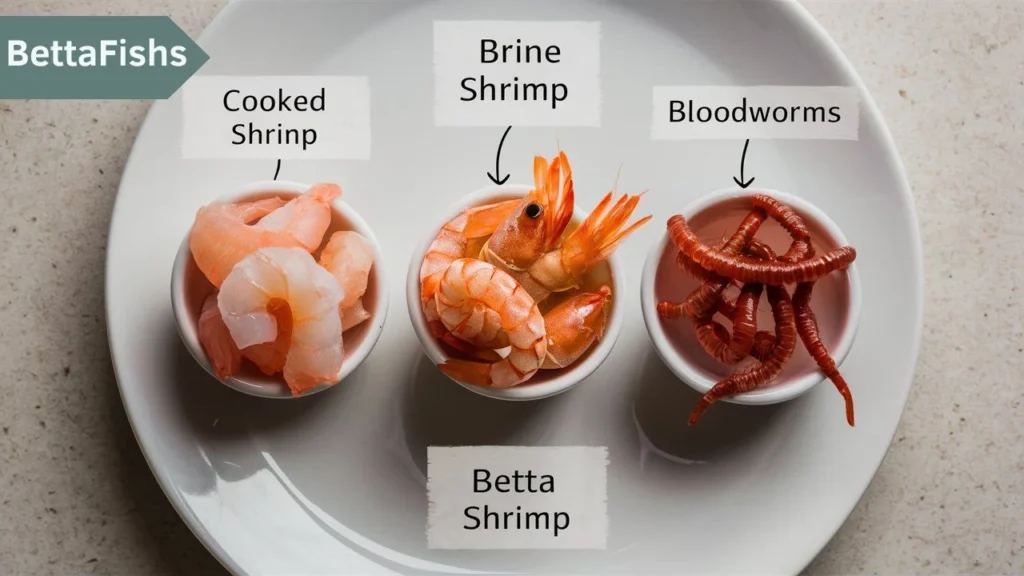
Common Mistakes Betta Owners Make
Even experienced betta owners can make mistakes when it comes to feeding.
Misconceptions About Feeding Bettas
One common misconception is that bettas can survive on plant-based food alone. While bettas may nibble on plants, they are carnivores and need a protein-rich diet to thrive.
The Dangers of Mixing Different Fish Foods
Mixing different types of fish food can be risky, especially if they’re not formulated for the same species. This can lead to an imbalance in nutrients and potentially harm your betta’s health.
How to Correct Feeding Mistakes
If you’ve made a mistake in feeding your betta, such as overfeeding or giving them the wrong type of food, the best course of action is to return to a balanced, betta-specific diet as soon as possible. Monitor your betta for any signs of distress and adjust their diet as needed.
Conclusion
Feeding your betta fish the right food is crucial for their health and longevity. While it might be tempting to feed them goldfish food in a pinch, it’s important to understand that bettas have unique dietary needs that must be met with protein-rich, betta-specific food. By providing your betta with the proper nutrition, you’ll ensure they stay healthy, vibrant, and full of life.
FAQs
Can Bettas Eat Human Food?
While some human foods, like small pieces of cooked shrimp or fish, can be safe in small amounts, it’s generally not recommended to feed bettas human food. Stick to food specifically formulated for bettas to ensure they get the right nutrients.
Is Live Food Better for Bettas?
Live food, like bloodworms or brine shrimp, can be a great treat for bettas and closely mimics their natural diet. However, it should be offered in moderation and as part of a balanced diet.
How Often Should I Feed My Betta?
Bettas should be fed 1-2 times a day, with small portions that they can consume within 2-3 minutes. Avoid overfeeding to prevent digestive issues.
Can Bettas Survive on Plant-Based Food?
No, bettas are carnivores and require a diet high in animal protein. While they may nibble on plants occasionally, plant-based food alone will not meet their nutritional needs.
What Should I Do If My Betta Refuses to Eat?
If your betta refuses to eat, check the water temperature and quality in their tank. Bettas are more likely to eat in warm, clean water. You can also try offering different types of betta food to see if they prefer one over the other.


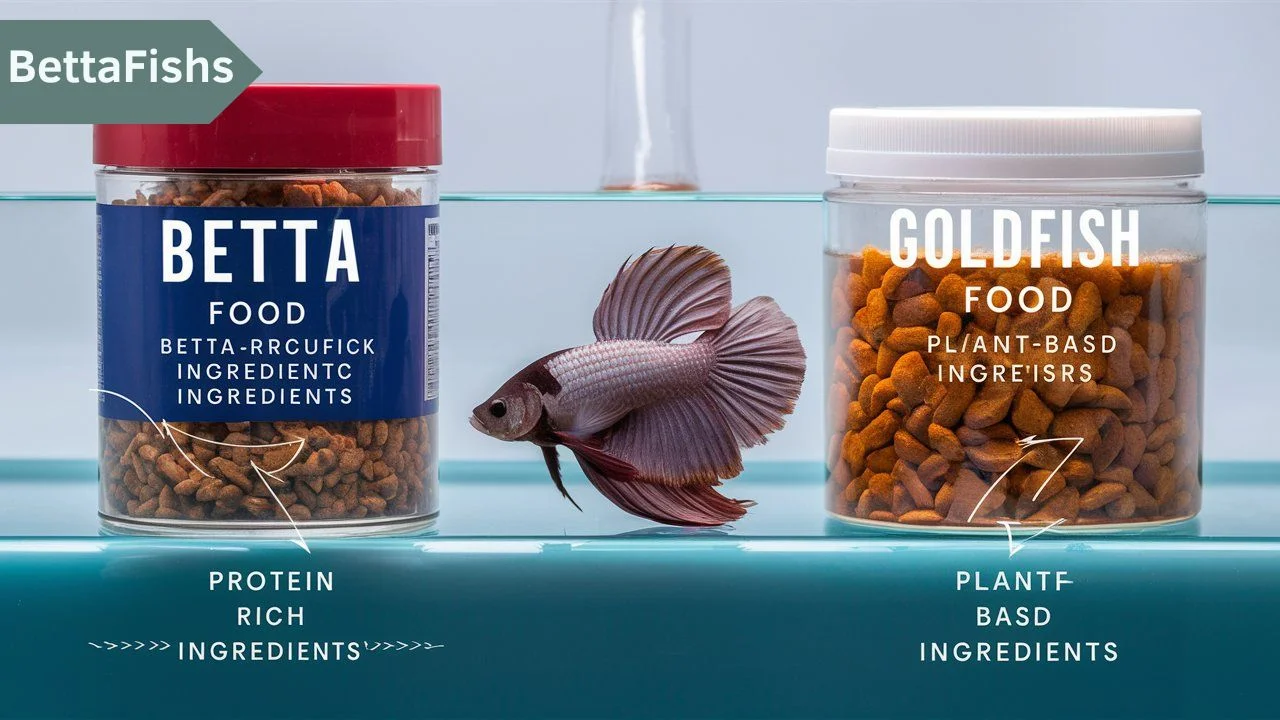
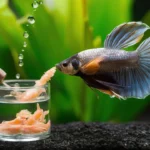
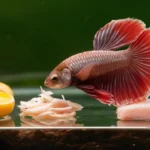
Your posts are always so detailed and well thought out.